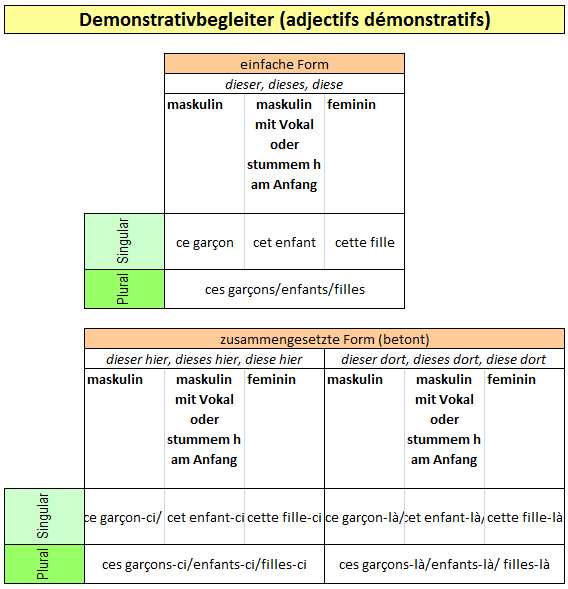
¡Cuidado! 11+ Verdades reales que no sabías antes sobre Demonstrativpronomen Französisch Celui
In this third episode of Alexa's French language practice videos, Alexa looks at demonstrative adjectives: CE, CES, CET, CETTEBisou Bisou 💋 Support us and g.

Demonstrativbegleiter ce, cet, cette, ces einfach besser erklärt! YouTube
Ce,cet,cette et ces sont des adjectifs démonstratifs. Ils s'accordent en genre et en nombre avec le nom qu'ils accompagnent. CE + nom masculin commençant par une consonne, sauf le H muet. ==> Ce chien / Ce hibou CET + nom masculin commençant par une voyelle ou par la consonne h muette. ==> Cet arbre, cet homme CETTE + Nom féminin ==> Cette fille

FLE Adjectifs démonstratifsFrench
Demonstrative adjectives indicate specific things. Learn French possessive adjectives usage and find out possessive adjectives types, examples and common mistakes. Beginners A0-A2. Demonstrative adjectives ce, cette, cet, and ces, A1. this / that. these / those. masculine. ce. ces.

Les adjectifs démonstratifs (ce, cet, cette, ces) en français, fle grammaire 13 YouTube
Last updated: 2023-09-18 French » Library » Grammar » Level A2 » Adjectives & Adverbs » Ce/cet/cette and ces = this/that and these/those (French Demonstrative Adjectives) Demonstrative adjectives specify a particular noun or group of nouns among a larger group. Learn how to say this/these and that/those in French
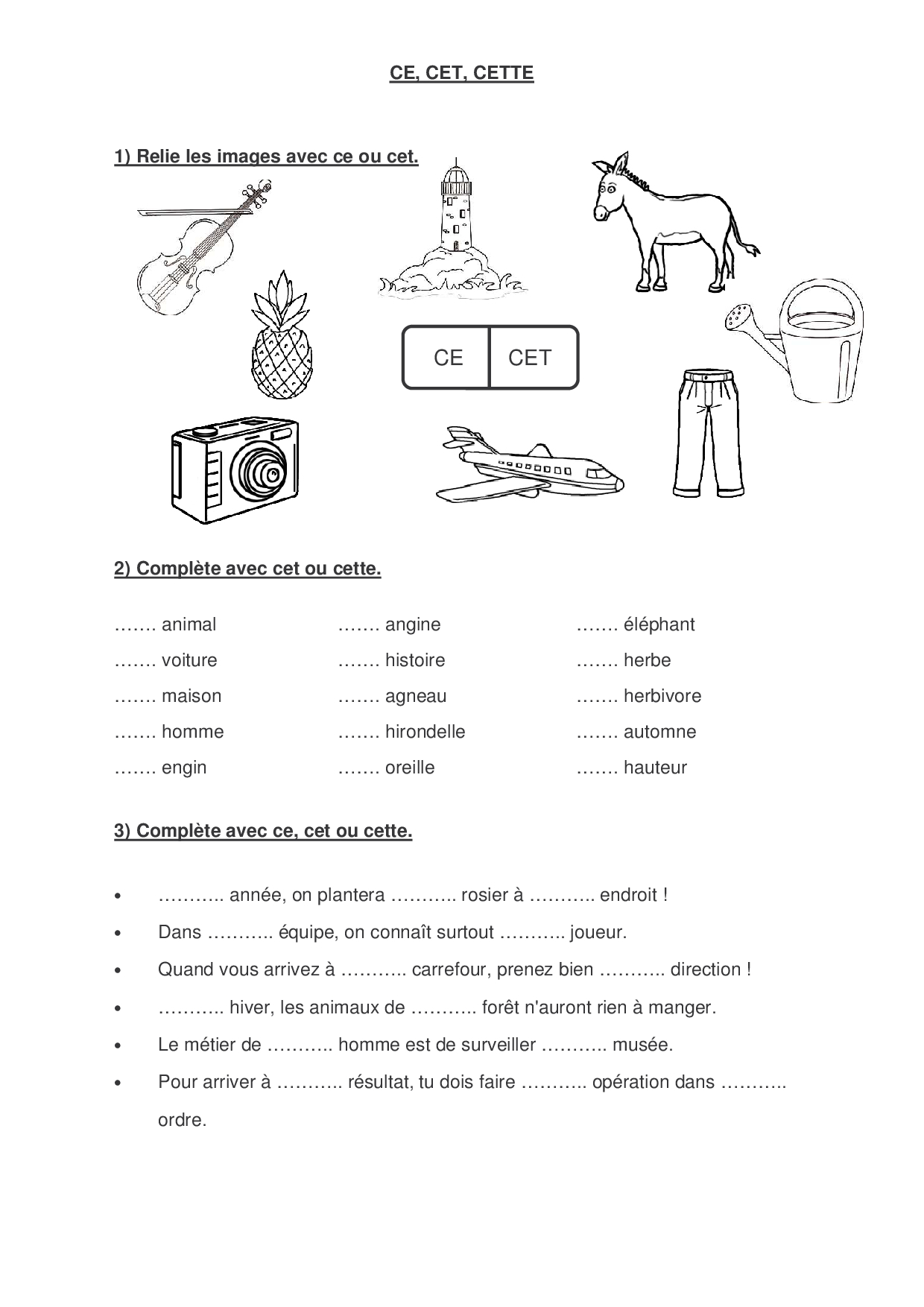
Ce , cet , cette exercices AlloSchool
CET timing. CET (Central European Time) is one of the well-known names of UTC+1 time zone which is 1h. ahead of UTC (Coordinated Universal Time).The time offset from UTC can be written as +01:00. It's used during the winter. During the summer CEST - Central European Summer Time (UTC+2) is in use. Some locations use CET all year long.

French Lesson 93 Demonstrative Adjectives THIS THAT Adjectifs démonstratifs CE CET CETTE CES
Ce, Cet: Masculine, singular nouns Ce in French is used for masculine, singular nouns which start with a consonant. This / that landscape is magnificent. - Ce paysage est magnifique. I have never seen this / that boy before. - Je n'ai jamais vu ce garçon avant. Ce is also used when a masculine noun starts with an "H aspiré."
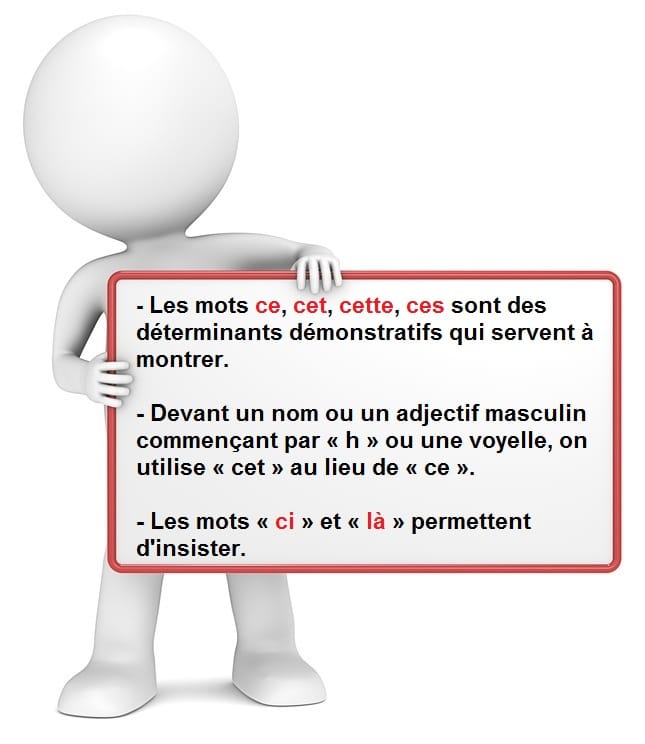
Ce, cet, cette, ces, ci là
January 23, 2021 In this grammar lesson you will learn about how to use ce cet cette ces. In this lesson you will learn about: how to use ce cet cette ces how ce cet cette ces are used in French sentences how you can quiz yourself on how to use ce cet cette ces how to practice with flashcards on how to use ce cet cette ces

Grammaire Les adjectifs Démonstratifs (cette, cet, ce, ces) YouTube
French demonstrative adjectives: ce, cet, ces, cette Demonstratives adjective are used to point out specific things. In French they are ce, cet, cette and ces, and translate to this, that, these and those. They must agree with the noun they precede. Example sentences of demonstrative adjectives
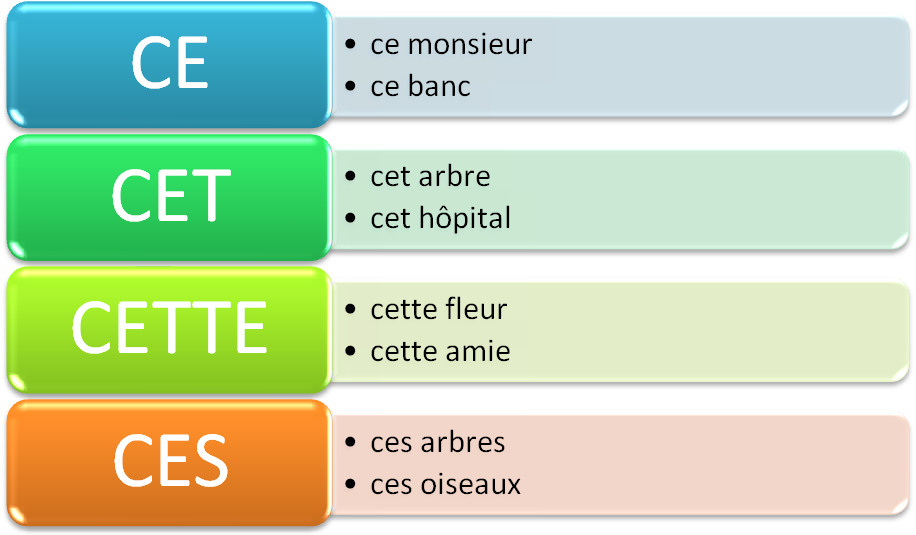
Portal do nauki języka francuskiego MówimyPoFrancusku.pl
On met ce devant les noms qui commencent par une consonne, & cet devant ceux qui commencent par une voyelle. Ce cheval. Cet oiseau. Cette femme. Ces animaux. Ces bêtes. Ce, est quelquefois pronom démonstratif substantif, & signifie la chose dont on parle. Ce que je vous dis. Ce qui se passe.

17 Best images about Vive le français grammaire on Pinterest Language, Studentcentered
Demonstrative adjectives are used to indicate the proximity or distance of the noun they modify in relation to the speaker or listener. In French, there are four main demonstrative adjectives: "ce," "cet," "cette," and "ces.". 1. Ce (masculine singular): This adjective is used to refer to a noun that is close to the speaker or.

How To Use Ce Cet Cette Ces = This/That/These/Those [+9 Examples] Language Atlas
When planning a call between CET and CEST, you need to consider time difference between these time zones. CET is 1 hour behind of CEST. If you are in CET, the most convenient time to accommodate all parties is between 9:00 am and 5:00 pm for a conference call or meeting. In CEST, this will be a usual working time of between 10:00 am and 6:00 pm.
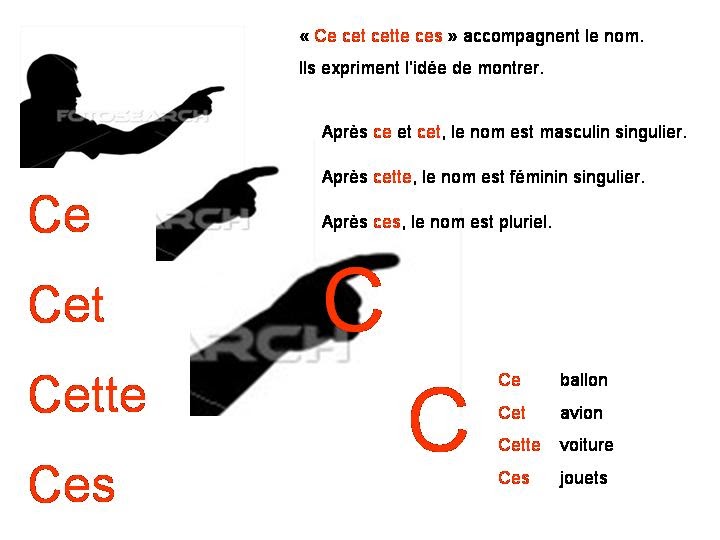
Le Français Les déterminants démonstratifs
They're called demonstrative adjectives: ce, cet, cette, and ces. As you know, everything in French has a gender. 1- Ce. Ce means this or that attached to a masculine singular noun. Par exemple: Je veux ce chien. I want this dog, or, I want that dog. Because chien is masculin singulier. Ce gâteau est délicieux. This or that cake is delicious.
Francuski przy kawie język francuski Zaimki wskazujące (ce, cet, cette, ces)
Complete the gaps with the correct demonstrative determiner (ce/cet, cette, ces). Lucas porte pullover depuis deux jours. Je voudrais baguette s'il vous plaît. Regarde avion! deux films sont mes films préférés. Est-ce qu'il faut sortir à station de métro? Choose the correct form. n'est pas grave. La troisième chanson de ce CD est que je préfère.

Demonstrative adjectives CE, CET, CETTE, CES French Truly Helping you a little bit
Masculine: ce Masculine in front of a vowel: cet Feminine: cette + When a singular demonstrative adjective precedes a masculine noun or adjective that begins with a vowel or h muet, cet is used to avoid a hiatus - learn more. Par exemple… + There is only one plural demonstrative adjective: ces. Cettes does not exist, and neither does cets.

Les adjectifs démonstratifs ce, cet, cette, ces Conjugaison, Fle, Verbe
ce téléphone this / that telephone: cet: masculine singular begins with a vowel or H: cet homme this / that man cet hôtel this / that hotel cet ami this / that friend: cette: feminine singular: cette femme this / that woman cette maison this / that house cette ville this / that city: ces: masculine or feminine plural: ces stylos these.
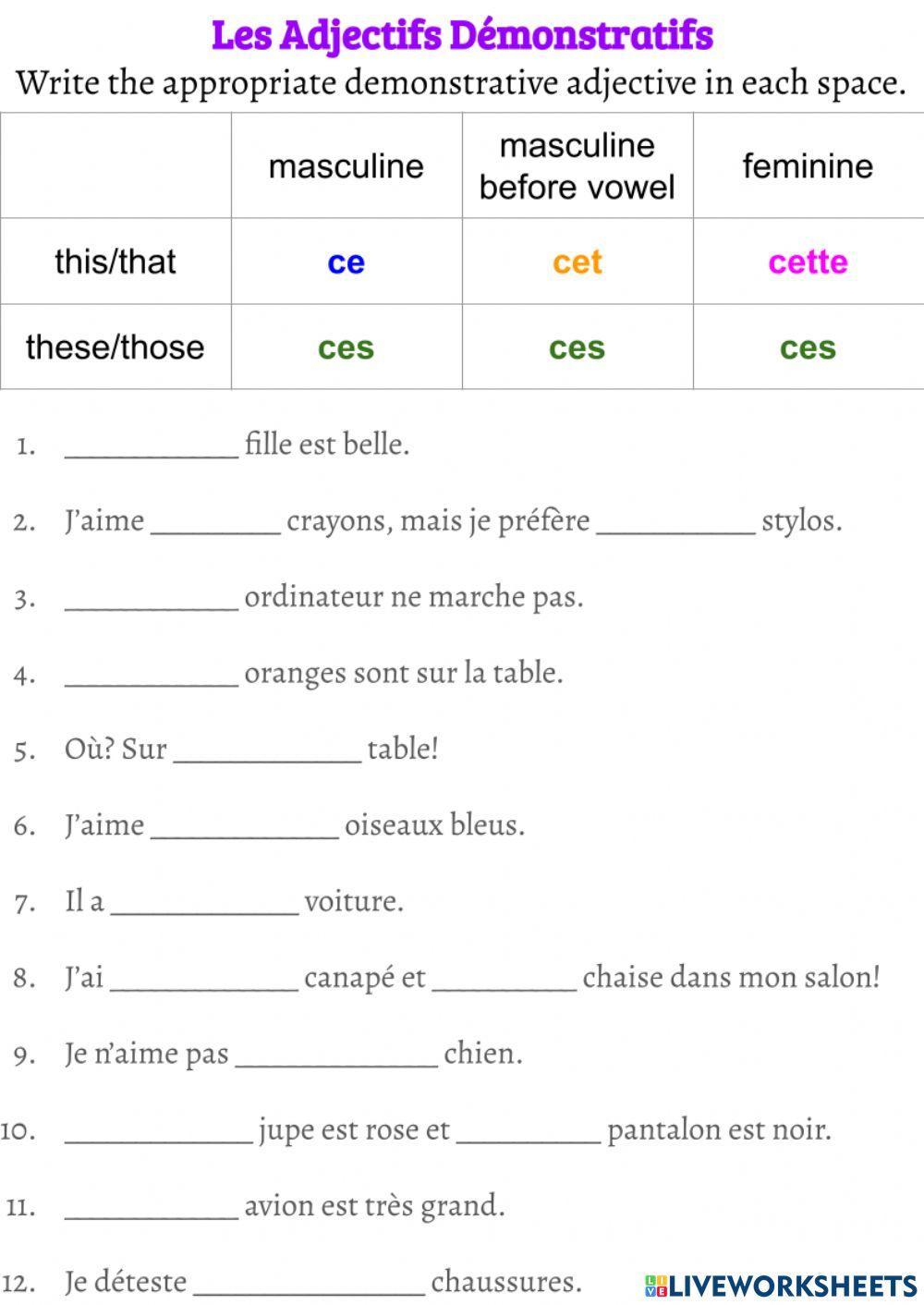
Les adjectifs démonstratifs ce, cet, cette, ces interactive worksheet Live Worksheets
In French you use the demonstrative adjective ce to point out a particular thing or person. Like all adjectives in French, ce changes its form to cette, cet or ces, depending on whether you are referring to a noun that is masculine or feminine, singular or plural.